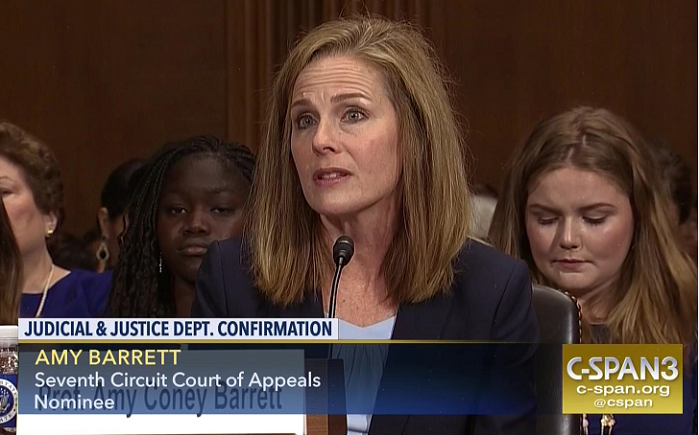Judge Amy Coney Barrett, considered a top choice for the U.S. Supreme Court, has a record of supporting pro-life laws during her time on the Seventh Circuit Court of Appeals.
Though her record is not long, having only been appointed to the Seventh Circuit in 2017, she did participate in two cases involving Indiana abortion laws, according to National Review. In both cases, the full court (en banc) decided whether to rehear rulings by panels of judges.
The first, Planned Parenthood v. Commissioner, involved an Indiana law requiring the remains of aborted babies to be buried or cremated. The Supreme Court later upheld the law, but, when it was before the Seventh Circuit, Barrett was involved.
According to the report:
In, the en banc court, by an evenly divided vote, denied Indiana’s request that it review the panel ruling that held that a state provision regulating the disposal of fetal remains was unconstitutional. Barrett was one of five dissenters. She joined an opinion by Judge Frank Easterbrook that pointed out that the panel had “held invalid a statute that would be sustained had it concerned the remains of cats or gerbils.” … On summary disposition (without even the need for oral argument), the Supreme Court reversed the panel ruling by a 7-2 vote. Justice Breyer and Justice Kagan were part of the majority.
In other words, Barrett was in favor of the full court hearing Indiana’s defense of its law.
She also joined Easterbrook in questioning the panel’s rejection of another part of the law. That part prohibits abortions based on an unborn baby’s race, sex or disability.
HELP LIFENEWS SAVE BABIES FROM ABORTION! Please help LifeNews.com with a donation!
The report continues:
The panel had ruled the provision invalid. Easterbrook opined that Supreme Court precedent did not clearly govern the question. He did not support en banc rehearing on that question, but instead said that he was “content to leave it to the Supreme Court.” (Some folks on the Left object to the fact that he used the shorthand “eugenics statute” for the provision. I’d counter that “anti-eugenics statute” would have been a better shorthand.) The Supreme Court denied review.
Barrett also took part in the case Planned Parenthood v. Box, a challenge to an Indiana law about parental notification before a minor has an abortion. The law requires that if a minor receives permission to have an abortion from a judge, rather than her parents, the court still must notify her parents unless the judge decides that not doing so is in the girl’s best interests.
Again, in that case, Barrett was in favor of the full court hearing Indiana’s defense of its law after a panel ruled against it, according to the report.
National Review noted that she also was involved in a third abortion-related case involving a Chicago buffer zone outside abortion facilities. Barrett joined the unanimous ruling on Price v. City of Chicago that upheld the law. However, in doing so, she was following U.S. Supreme Court precedent, as lower court judges are bound to do.
According to the report, “the Chicago ordinance is indistinguishable from the Colorado law” that the U.S. Supreme Court previously upheld.
Trump plans to announce his choice to replace the late U.S. Supreme Court Justice Ruth Bader Ginsburg at the end of the week. Many believe Barrett is a top candidate on Trump’s list.
Though her judicial rulings on abortion are few, she has made several statements about the value of babies in the womb. According to the Law and Crime blog, Barrett signed a public letter in 2015 that emphasized “the value of human life from conception to natural death.” In an interview with Notre Dame Magazine, she also stated that “life begins at conception.”
Barrett is a former clerk of the late Supreme Court Justice Antonin Scalia, a strong conservative who died unexpectedly in 2016. Like Scalia, Barrett describes herself as an “originalist” judge.








